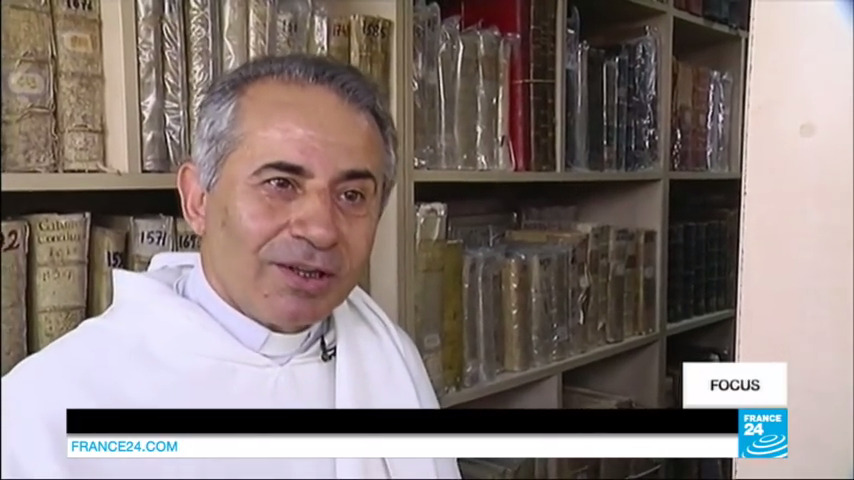A Minnesota Monk Takes on ISIS
COMMENTARY: Under dangerous and sometimes life-threatening circumstances, Benedictine Father Columba Stewart carries on the Benedictine tradition of preserving ancient manuscripts for posterity.

It all began with one of the most ambitious smuggling operations of modern times.
Back in 2012, the year Islamist militants linked to al-Qaida occupied Timbuktu, in the West African country of Mali, hundreds of volunteers packed a few small, nondescript metal lockers into their cars and headed for the city of Bamako, a 12-hour drive away, much of it through the Sahara Desert.
Inside the metal boxes were priceless, centuries-old manuscripts that were in danger of being destroyed by radicals who had demonstrated their contempt for the sacred and literary treasures in Libya, where they had sacked and destroyed so many of the country’s libraries.
To keep a low profile, when they reached checkpoints manned by the terrorists, these “manuscript-traffickers,” as The Economist characterized them, did everything in their power not to make the guards suspicious — hence, the small load they carried. If there was a crackdown at checkpoints out of Timbuktu, the ever-resourceful smugglers packed their treasures onto boats and sailed down the Niger River to Bamako. Thanks to this low-tech, low-profile rescue effort, more than 370,000 manuscripts were spirited out of Timbuktu to safety.
Once these treasures reached their destination, the “smugglers” turned them over to Abdel Kader Haidara, an expert in Islamic manuscripts, who stashed them in safe houses. There is no counting how many drivers were involved in the operation or how many people in Bamako are concealing in their homes a treasure trove of irreplaceable books.
But more was still needed to ensure that the Timbuktu collections would be preserved, and for that task, Haidara turned to a Benedictine monk of St. John’s Abbey in Collegeville, Minnesota.
Benedictine Father Columba Stewart heads up the Hill Museum and Manuscript Library (HMML) at the abbey. When he heard from Haidada, Father Stewart was already in charge of a collection of 100,000 rolls of microfilm of what the monk describes as “basically the manuscript culture of Europe.” In fact, the HMML — where Father Stewart has been director since 2003 — is “blind” when it comes to the provenance of a manuscript. Country of origin and faith of the author — these things are not important.
Preserving an ancient text is what matters. His quest to save precious books from the ravages of time and the depredations of 21st-century barbarians has taken Father Stewart to Ethiopia, the Balkans and India, as well as such dicey spots as Iraq and Syria. (He confessed to The Economist reporter that he spends so much time in the air he has diamond status on Delta). Lately, saving manuscripts from ISIS has been his major preoccupation.
Since 2010, HMML has been in partnership with the Centre Numérique des Manuscripts Orientaux (Digital Center for Eastern Manuscripts, or CNMO), an organization founded in Mosul, Iraq, by a Dominican priest, Father Najeeb Michaeel. Together, HMML and CNMO have taken digital photographs of more than 5,000 manuscripts that trace the religious and cultural history of Christians in what has become one of the most volatile corners of the world. The oldest digitized document dates from the seventh century. The threat to this rich patrimony of Mesopotamian Christianity became especially urgent in 2014, when ISIS invaded Mosul. Father Michaeel and his team managed to escape with all the manuscripts in their library, but they had to leave all their lab and digitizing equipment behind.

Over the years, Father Stewart has encountered directors of museums and libraries as well as private collectors who are leery about giving a Westerner access to their treasures. During the colonial period, too, many ancient manuscripts were carried off to libraries in Europe. Present-day archivists and collectors will not tolerate a repetition of the “bad old days.” But Father Stewart’s vocation as Benedictine monk often gets him into collections that might be closed to a secular scholar. Since St. Benedict founded the religious order about the year 530, Benedictine monks have been guardians and copyists of irreplaceable books and manuscripts. “Everybody knows about the Benedictines,” Father Stewart told Matteo Fagotto of The Atlantic magazine. “Manuscripts and learning — this is part of our identity, a brand which is somehow universal.” Then he added, “Being a monk puts me in a very different category. People understand I am not representing a big business or an imperialist cultural agency.”
When an HMML team comes to an archive, it hires and trains local people to digitize their cultural treasures. The manuscripts they are saving were created by their ancestors; now, they will be preserved for their descendants.
One of Father Stewart’s projects is digitizing the archives of St. Mark’s Syrian Orthodox Monastery in Jerusalem, where the oldest manuscripts in the collection were written in the sixth century — the same time as St. Benedict formed his first community of book-loving monks. Shimon Çan, the librarian at St. Mark’s, explained his enthusiasm for the digitization project this way: “These books were left by our Holy Fathers. It is our duty to open these treasures to the world and let our youngsters understand the wisdom they exude.”
Tragically, 2,000 of the 6,000 manuscripts — Christian and Muslim — that HMML digitized in Iraq have been destroyed by ISIS. No one knows how many were lost in Syria.
“I try not to think about that, because if I do, I get really upset,” Father Stewart said. “But it would be more painful if I heard of something that was destroyed that we didn’t photograph, because that would be totally lost.”
Thomas J. Craughwell, the author of Saints Behaving Badly
and This Saint Will Change Your Life,
writes from Bethel, Connecticut.

















